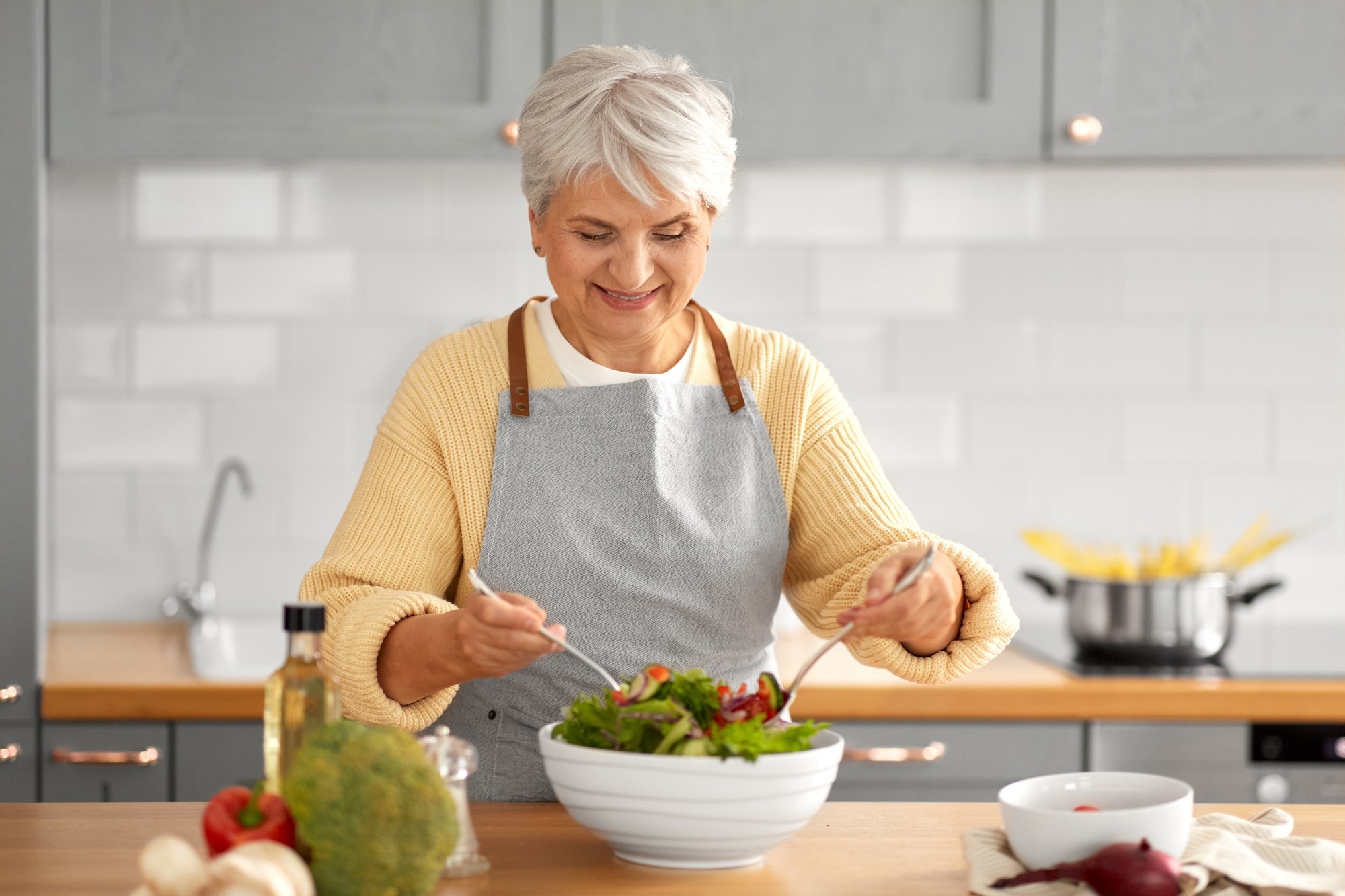A current examine printed within the Vitamins Journal in contrast menopausal signs and meals consumption in post-menopausal ladies earlier than and throughout the coronavirus illness 2019 (COVID-19) pandemic.
 Examine: Adjustments in Meals Consumption in Postmenopausal Girls throughout the COVID-19 Pandemic: A Longitudinal Examine. Picture Credit score: GroundPicture/Shutterstock.com
Examine: Adjustments in Meals Consumption in Postmenopausal Girls throughout the COVID-19 Pandemic: A Longitudinal Examine. Picture Credit score: GroundPicture/Shutterstock.com
Background
The pandemic has considerably impacted international well being methods, the financial system, and the meals provide. Submit-menopausal ladies’s dietary habits and signs throughout the extreme acute respiratory syndrome coronavirus 2 (SARS-CoV-2) outbreak are essential for mitigating long-term well being issues.
Research present that post-menopausal ladies are inclined to have larger sugar and refined carbohydrate consumption, resulting in elevated psychological, vasomotor, urogenital, and somatic signs and sleep disturbances.
Conversely, patterns involving greens, complete grains, and unprocessed meals decrease the depth of menopausal signs. Entry to wholesome meals and common consumption of wholesome meals can cut back susceptibility to COVID-19 and its long-term penalties. Understanding these habits and their relationship with post-menopausal signs is important for healthcare planning.
In regards to the examine
Within the current longitudinal examine, researchers assessed adjustments in dietary patterns of post-menopausal ladies related to the SARS-CoV-2 outbreak.
The survey-based examine was carried out on post-menopausal (12 months after the final menstrual interval) Brazilian ladies aged 40 years and older from January 2018 to 2021.
The group used the Girls’s Well being Questionnaire (W.H.Q.), the Kupperman-Blatt Menopausal Index (Ok-BMI), the Worldwide Bodily Exercise Questionnaire (I.P.A.Q.), the World Well being Group (WHO) scale, and one-day dietary recollects for knowledge assortment.
The questionnaires included anthropometric (physique mass, waist circumference, and top), sociodemographic (ethnicity, age, marital standing, training, and earnings), medical (participant’s age at menopause), and life-style (alcohol consumption and smoking standing) domains.
The group excluded (i) people with surgical menopause; (ii) present most cancers analysis and utilization of chemotherapy medicines; (iii) untreated lively thyroid and parathyroid hormonal issues; (iv) persistent hepatic failure; and (v) persistent kidney failure.
Meals gadgets listed by the people of their dietary recollects have been transformed from family measures to grams and milliliters utilizing the Reference Desk for Measures of Meals Consumed in Brazil. The meals quantities have been then transformed into kilocalories utilizing the Dietary Composition Desk of Meals Consumed in Brazil, and for members reporting including sugar to their drinks, 10% of the beverage quantity was thought of added sugar.
The NOVA classification was used to categorise meals primarily based on the extent of processing into processed and ultra-processed meals and culinary preparations. The follow-up analysis was carried out from August 2020 to January 2021.
Outcomes
Initially, 288 ladies have been recognized, amongst whom 274 have been keen to take part within the examine, and 78 (29%) accomplished all of the assessments throughout COVID-19. Among the many examine members, 97% had not acquired a COVID-19 analysis, and 80% have been remoted however employed by means of January 2021. The imply age of the members was 56 years, and the imply age at menopause was 48 years.
The imply menopause period was eight years. Among the many members, 146 (53%) have been Whites, 145 (53%) have been married or lived with their companions, 175 (64%) had their month-to-month earnings lower than or equal to 2 minimal wages, and 123 (47%) acquired training for equal to or greater than 12 years.
Additional, 105 (39%) have been obese, 147 (54%) have been bodily inactive, 227 (83%) have been non-smokers, and 202 (74%) didn’t eat alcohol.
Symptom depth was decrease throughout COVID-19 in comparison with pre-pandemic instances. Important enhancements have been famous in vasomotor, paresthesia, insomnia, nervousness, melancholy, vertigo, weak point, complications, palpitations, and tingling signs throughout the SARS-CoV-2 pandemic in comparison with pre-pandemic instances.
Protein, lipid (saturated fatty acids, monounsaturated fatty acids, and trans-fatty acids), processed meals, and calorie consumption have been decrease throughout COVID-19 than earlier than. As well as, plain yogurt and milk consumption have been decrease, whereas candy meals and sugary beverage consumption have been larger throughout the SARS-CoV-2 pandemic.
Conclusions
The examine findings confirmed that post-menopausal ladies consumed extra sugary drinks and candy meals. In distinction, plain yogurt, milk, and processed meals have been consumed much less throughout COVID-19 than throughout pre-pandemic durations.
Moreover, throughout COVID-19, macronutrients and calorie intakes have been lowered. The findings again up analysis from different nations, together with France, Italy, Brazil, and the USA.
The findings may also help the healthcare system reply to post-menopausal ladies’s wants throughout a worldwide public well being disaster.
To construct a sustainable and equitable long-term care system, the healthcare system should realign itself to deal with the wants of post-menopausal ladies.
